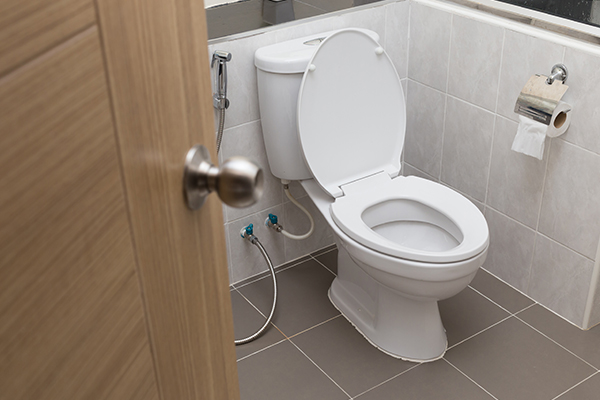In this article:
Dysuria refers to a painful or burning sensation while urinating. This may be caused by any factor that causes irritation or inflammation in the urethra, such as infection or chemicals.

While the medical treatment for dysuria depends on its cause, various home remedies and lifestyle changes can help you in managing the condition and avoiding further problems.
Home Remedies for Dysuria
The following home remedies may help alleviate dysuria.
1. Increase water intake
Increasing the amount of water you drink throughout the day promotes frequent urination. This helps in flushing out infectious microbes and toxins from your body, thus relieving pain and managing infections. (1)
Also, dehydration can aggravate the condition. Drinking water at regular intervals prevents dehydration and also helps maintain body heat.
Water-based fruits and vegetables, smoothies, coconut water, juices, soups, and broths can also be consumed as fluid sources to maintain optimum hydration levels in the body.
2. Consume cranberry juice and vitamin C

Intake of ascorbic acid, or vitamin C, supplements is known to alleviate UTIs by making the urine more acidic. (2)
Cranberries are 88% water and contain fructose, organic acids (such as salicylate), anthocyanidins, triterpenoids, catechins, flavonoids, and high levels of vitamin C (200 mg/kg of berries).
Women with UTIs have conventionally used a cocktail drink with about 25% of cranberry juice for UTI prevention. (3)
Note: If you have kidney problems, refrain from using vitamin C supplements without your doctor’s recommendation. Excessive vitamin C can increase oxalate concentration in the urine and may lead to kidney stones.
3. Apply a warm compress
Applying a warm compress can help in alleviating bladder pressure and subsiding pain, giving a soothing effect. You may also use a heating pad in place of the compress.
How to use:
- Soak a fresh washcloth in warm water and wring out the excess water.
- Apply the compress to your lower abdomen for 5 minutes.
- Reapply after a few minutes.
Note: Keep changing the position of the compress to prevent burning your skin. Do not use an extremely hot compress.
4. Consume probiotics
Probiotics are formulations made of the healthy microbes present in your intestines. Intake of probiotics can help rebalance the microbial population in the body, thus improving function and managing infections.
Probiotics have been employed in the prevention of UTIs and candidiasis. However, further studies are needed to warrant their efficacy. (4)
You can consume probiotic-rich foods such as sauerkraut, yogurt, and fermented dairy products. If you fail to get your required intake through diet alone, you can consider taking probiotic supplements but only after consulting your doctor.
Note: If you wish to get any long-lasting improvement from probiotic supplements, make sure to take them in the prescribed way and dosage, or else their positive effects will dissipate within a few weeks.
Preventive Self-Care Measures

The following self-care measures can help in preventing dysuria and providing relief:
- Practice relaxation techniques to alleviate stress and tension, which can worsen the condition.
- Change into dry clothes immediately after swimming or getting wet.
- Refrain from using vaginal sprays, douches, and soaps that contain irritants.
- Avoid the consumption of spicy foods, caffeine, artificial sweeteners, and carbonated drinks.
- Do not wear body-fitting clothes such as tight jeans and trousers and use cotton underwear.
- Frequently change sanitary napkins and tampons.
- Wash before and after sexual intercourse and use protection.
- Urinate after sex to flush out the microbes from the urethra and bladder.
- Do not control your need to urinate.
- Restrict alcohol intake and smoking.
- For women, wipe in a front-to-back motion after having a bowel movement or urination, and keep the genital area clean and dry.
Most-Asked Questions About Dysuria

How long does dysuria last?
The duration of dysuria depends on the cause. A UTI may subside in a few days on treatment. However, it can be challenging to determine the reason for the dysuria in some cases, leading to prolonged symptoms.
Is dysuria a disease?
Dysuria is a symptom of various medical problems, not a disease in itself.
What is the prognosis of dysuria?
Dysuria commonly occurs as a result of infections in the urethra, bladder, kidney, or vagina, which can be treated with antibiotics. Timely treatment prevents any long-term damage.
However, dysuria caused by sexually transmitted diseases may lead to scarring of the reproductive tract and infertility in women if not attended to immediately.
Does dysuria normally accompany hematuria?
The appearance of blood in the urine is medically termed as hematuria and results from improper filtering by the kidneys. Various medical conditions can lead to hematuria, which might be accompanied by dysuria.
A study showed that dysuria and hematuria might occur simultaneously with symptoms such as penile or periurethral pain, bladder spasm, and skin irritation, without any infectious causes. (5)
What can cause painful urination in pregnant women?
During pregnancy, women often notice an increase in the frequency of urination. While this is normal, experiencing pain while peeing may be indicative of diseases, including chlamydia, genital herpes, trichomoniasis, bacterial vaginosis, endometriosis, and urinary tract infection.
Can someone suffer from dysuria while menstruating?
Females with endometriosis may experience dysuria during menstruation. Endometriosis is an unusual growth of uterine tissue outside of the uterus. It affects around 11% of women in the age group 15–44. (6) Endometriosis is often accompanied by dysuria, urinary frequency, and hematuria, especially when the bladder is affected. (7)
Can dyspareunia and dysuria occur together?
Dyspareunia refers to painful sexual intercourse and can occur along with dysuria in some cases of atrophic vaginitis.
In atrophic vaginitis, the vaginal tissue becomes thin and dry due to a lack of discharge, leading to dyspareunia. If the vulva is involved, the patient may also experience dysuria and a burning sensation in the vulva.
Can dysuria and pyuria co-occur?
The urine may contain leukocytes or white blood cells (commonly known as pus) as a result of some health problems. This condition is medically known as pyuria and can turn the urine cloudy in appearance. It is usually caused by a urinary tract infection and thus might be accompanied by dysuria.
When is dysuria more common?
Dysuria is prevalent in the summer season because of dehydration. Low consumption of water can lead to concentrated urine, which is highly acidic and may cause pain and burning.
Can dysuria have psychogenic causes?
Dysuria can result from psychogenic causes, such as hysteria, anxiety, and depression. It is important that the medical history of the patient is studied, and tests are done to eliminate other causes, following which appropriate therapy can be suggested for the psychogenic cause.
What dietary changes should be made to ease dysuria?
Dietary changes alone will only address dysuria in some scenarios. It is important that patients with dysuria be evaluated by at least their primary care physician or by a urologist.
Can taking baking soda mixed in water help ease dysuria?
No.
Final Word
A painful sensation once in a while during urination is common. However, if the condition persists or is severe, it is wise to consult your doctor for dysuria.
While staying hydrated and following hygienic measures can help manage the condition, severe cases require proper medical treatment. Therefore, it is best to use these home remedies only as complementary treatments to aid relief.

- Was this article helpful?
- YES, THANKS!NOT REALLY


